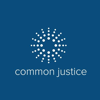This summer, Common Justice presents a handpicked selection of literary gems that delve into the interconnected themes of decarcerating, race, and healing. Whether you're a seasoned advocate for criminal legal reform or someone taking their first steps in this movement, these books are bridges that connect personal narratives to collective understanding that prisons are not the answer to violence. As we reflect on the progress made and the work that lies ahead, this collection invites us to challenge conventional narratives on crime and punishment, and engage in meaningful conversations that guide us towards a future that shows us that something else is possible.
Until We Reckon by Danielle Sered asks us to reconsider the purposes of incarceration and argues that the needs of survivors of violent crime are better met by asking people who commit violence to accept responsibility for their actions and make amends in ways that are meaningful to those they have hurt—none of which happens in the context of the criminal legal system today.
Slavery by Another Name by Douglas Blackmon argues that slavery in the United States did not end with the Civil War, but instead persisted well into the 20th century.
Bird Uncaged by Marlon Peterson is a moving memoir about coming of age in Brooklyn and surviving incarceration—and a call to break free from all the cages that confine us.
Are Prisons Obsolete? by Angela Davis examines the evolution of carceral systems from their earliest incarnation to the all-consuming modern prison industrial complex.
Beyond Survival by Ejeris Dixon seeks to solve the problem of violence at the grassroots level, without relying on punishment, incarceration, or policing. It puts these strategies front and center as real alternatives to today’s failed models of confinement and “correction.”
Healing Justice Lineages by Cara Page is an anthology that guides us through the history, legacies, and liberatory practices of healing justice—a political strategy of collective care and safety that intervenes on generational trauma from systemic violence and oppression.
Abolition Geography by Ruth Wilson Gilmore draws on the lessons of grassroots organizing and internationalist imaginaries, and undoes the identification of abolition with mere decarcerating, reminding us that freedom is not a mere principle but a place.
Unapologetic by Charlene Carruthers challenges all of us engaged in the social justice struggle to make the movement for Black liberation more radical, more queer, and more feminist. It provides a vision for how social justice movements can become sharper and more effective through principled struggle, healing justice, and leadership development.
The Little Book of Restorative Justice by Howard Zehr emphasizes the necessity of identifying the justice needs of everyone involved in a crime and is a worldwide movement of growing influence that helps victims and communities heal, while holding individuals accountable for their actions.
Becoming Abolitionist by Derecka Purnell invites us to envision new systems that work to address the root causes of violence. This book shows that abolition is not solely about getting rid of police, but a commitment to create and support different answers to the problem of harm in society, and, most excitingly, an opportunity to reduce and eliminate harm in the first place.


Submit a Comment